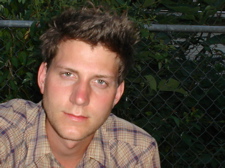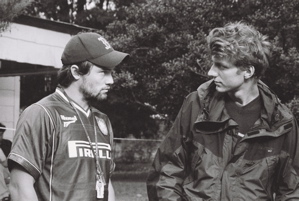Ein Interview mit Jeff Nichols, Regisseur von "Shotgun Stories" (Forum)

Wir treffen uns in der Lobby des Marriott. Jeff Nichols kommt mit seinem sehr stillen Produzenten, der in den 45 Minuten nur einen einzigen Anruf bekommt - das hatte ich mir bei amerikanischen Produzenten anders vorgestellt.
Jeff Nichols ist ein sehr sympathischer und auskunftsfreudiger Typ. Nach dem Interview, sagt er noch: Mann jetzt hab ich wirklich alles augespuckt, aber war toll!
Er wird nach dem Festival noch ein paar Tag emit seiner Verlobten durch Berlin schlendern, “Es gibt so viel anderes neben Filmen!” Recht hat er!
festivalblog: Mr. Nichols, your film deals with a very traditional, almost biblical issue: the fight between half-brothers, who have the same father who abandoned his first family. Since it is not a fight about money or a kingdom it seems more a fight about which „history“ of their father is true. How you came to that idea?
Jeff Nichols: There are certain battles that are going on for hundreds of years now, there is so much bad blood literally and there are so many reasons on both sides to kill that you ask yourself how can a fight like that possibly end? I came up with only two answers.
1. You have one side totally destroy the other side, that they can’t fight back ever
2. At some point someone on either side has to say. I’m not gonna do this, maybe on the cost of my own life.
I was reading a New Yorker article about an Israeli woman,....
....who was asked why she did not move away with her small kid? She said that it would be worse her son would abandon this fight then just die for the struggle. I was shocked by that and thought about what kind of history could I build where someone would be so deep in a fight that she sacrifices her kid - which is in a way very selfish because she imposes a conflict that her kid doesn’t know anything about on the next generation and passes it on. So parents write sometimes a script for us even if we don’t always live out that script. This is a story about two parents that laid out the path for their kids and they walk on it.
fb: The mother is a very vicious character and you leave her role in that tragedy in the dark, why did you do that? Is it a men’s world in “Shotgun Stories”?
J.N: No, I don’t think so. The women in their lives play a extremely important part. The mother for example, even if she is not present in the movie a lot she fuels that conflict and her character drives a lot of what happened. And also Son’s wife or Kids girlfriend play an important role for them. But nonetheless, it is definetly a masculine film. But the women in the background are very important.
In highschool I read Ibsens “A Dolls House” and I was shocked about that woman being ready to abandon her kids. That together with that story of the Israeli woman made me create the mothers character in the movie. And I decided to make a story where the mother kind of hates her own children for what went wrong in her life. And the kids will have to live out that later on.
fb: The conflict, the imagery of it and the music is very reduced and so the emotional explosions come kind of out of the sudden. Why did you decide no to develop the story in a classical drama kind of way so that all conflict leads to the climax and then it’s over?
J.N. If you make a movie about conflict resolution you will have this fights. But I did not want to have the violence in that movie really enjoyable for the audience, not like in a Kung Fu movie for example. The few fights in my life, which are not many, they were very awkward and they were very brief. The movie is about revenge and executing your emotions and I wanted to be the process these guys taking the revenge to be awkward and something that they are not used to.
Fb: Michael Shannon is great in that role of Son. Why did you choose him for that stoic and silent character? Because of his part in “Word Trade Center”, where he is a similiar character (The Marine, who keeps on searching)? Was it hard to convince him after a million Dollar production to join into newcomer’s movie?
J.N.: Actually he started shooting WTC after this movie. But before that he has been in a plenty of huge films. I found him through a professor of mine. He showed me, years ago, some tapes of Mike Shannon because he was stunned by him. When I saw them I said that is the guy that I want to write a role in any film I ever make. He is a force as a person and he is a force on screen.
But at that time I still was in college and three years went by but I still had him in mind when I was mapping out “Shotgun Stories”. But I never met him. So I got his cellphone number and called him saying, "Hey, you don’t know me, but I wrote a role for you in a script!" And he liked the script enough and asked my professor who I am. And my professor said, “Well you either waste three weeks of your life, or maybe, just maybe, you will be in something like “The Last Picture Show”, a movie that is something special. And I think we are somewhere in between (lacht).

Jeff Nichols (rechts) mit Cosmo Pfeil, dem 1. Regieassistenten
f.b.: Shotgun Stories, like some other American movies on the festival, is a movie that deals with violence. Away from the fact that blood revenge or a fight between half-brothers is classical material, what do you think is typical American (if there is something like that) in that fight and the way it is fought?
J.N.: Revenge stories are very old and take place all over the planet. But I do think Americans are predisposed to revenge stories. We like them! Its like in the Western: somebody kills the wrong guy, and he pays for it. You see it in American culture and politics too. That “Eye for an eye” thing is alive and well in America. And it is definitely something in a post 9/11 America you have to think about: How are we going to respond to this? Is the best thing to strike back, because you want to and it is your first reaction? I do not want to get too heady about this, but anyone who thinks about “Shotguns Stories” in that way and draws conclusions from it, is welcome.
Fb: The final scene is a wonderful example of family or some would say male friendship: Sitting on the porch, with a beer in your hand, sayin’ nothin’ and watching the sun set. What was the feeling you wanted to create? Is it that, when you think about home?
J.N. I definitely like to sit on the porch and drink beer! But in the movie it is not the happiest of endings - it is neither totally depressed. Some people were even suggesting to end the film with Son in the hospital, but I think that is not the idea of the movie. I did not want to make something that is totally devoid of hope. There is not a lot of hope at the end, but just enough that you would not be totally depressed. The problem with the blood revenge is, that it is passed on from generation to generation, and when Boy finally stands in front of all that wall of shotguns, without a weapon himself, what he is trying to do is to end the fight and not passing it on to the next generation. That is also a more positive outlook.
f.b.: Do you think that the attention on a European festival will help you in the US, since it is very hard for independent movies there, isn’t it?
J.N. This is the best possible thing that could happen to the movie and I am so grateful to the Berlinale! It is the best platform. In the US Sundance is huge, we applied but did not get in, and that seems to be a blessing in disguise. I don’t want knock Sundance but it would have been very easy to be seen on Sundance as another of that “Southern Gothics” and people saying, "yeah its good, but come on let’s go and see some movie stars". I mean, we spent so much time shooting the film on 35mm, making the landscape look huge, copy it and all that. It is not a video project, this is film - it is about cinema, as pretentious as it sounds. And to show the movie let’s say in a highschool gymnasium would have sucked.
So it is just fantastic: I come here to Berlin to show it in the Delphi, 700 seat theater, huge screen a fantastic sound system - that is the way movies should be seen and with an audience that just love movies and want to explore new cinema from around the world like here. I am just flattered to be here. And hopefully, when we get back to the US, we will have some preparation.
f.b. Mr. Nichols, thank you very much.
 Vereinigte Staaten
Vereinigte Staaten
Kommentare ( 1 )
staun...der interview schnell schreiber...sehr cool! und übrigens...da auf dem schwarzweissfoto...der typ rechts...ist das nicht cw in jungen jahren?
Posted by andreas | 16.02.07 09:07